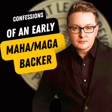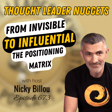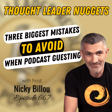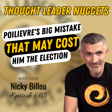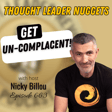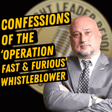Surviving a Hit: A Lucky Escape
00:00:02
Speaker
In 1986, one of our State Department communicators was driving from his house to the U.S. Embassy in Sana'a, Yemen, and he felt a car next to him as he was driving, and he just turned his head, and a Libyan hit team fired from the car. And as he was turning his head, the round went through his forehead and went around his scalp and exited the back. Because he turned his head, the trajectory just followed his scalp around as they're going into the head, much like what happened to President Trump.
Introduction to Thought Leader Revolution
00:00:36
Speaker
Welcome to the Thought Leader Revolution with Nikki Ballou. Join the revolution. There's never been a better time in history to speak your truth, find your freedom, and make your fortune. Each week, we interview the world's top thought leaders and learn the secrets of how they built a six to seven figure practice. This episode has been brought to you by eCircleAcademy.com, the proven system to add six to seven figures a year to your thought leader practice.
00:01:05
Speaker
Welcome to another exciting episode of the podcast, the Thought Leader Revolution. I'm your host, Nicky Baloo. And boy, do we have a special, exciting guest for you today. Today's guest is one of the world's leading thought leaders in the arena of counterterrorism. He's a true American patriot and a champion for freedom and the author of multiple best selling books, including Beirut Rules, which is a book that outlines the story of former Beirut CIA station chief William F.
Fred Burton Joins the Podcast
00:01:41
Speaker
Buckley's abduction and murder by Hezbollah terrorists. I am speaking, of course, of none other than the one, the only, the legendary
From Coal Miner's Son to Special Agent
00:01:51
Speaker
Fred Burton. Welcome to the show, Fred. Nikki, you're very kind. Thanks so much for having me on. Thank you for being here.
00:01:59
Speaker
So Fred, this show is a show that is a champion for freedom and a champion for freedom lovers. We tend to serve primarily entrepreneurs because Entrepreneurs, let's face it, need to be champions for freedom if they're going to make their entrepreneurial dreams come alive. But every once in a while, we interview someone in the world of politics and and geopolitics. um I've interviewed um some really great people on the show. I've interviewed the great Wayne Allen Root. ah Oh, my God. i And I'm forgetting the fella's name, but he's um he's a fellow who was a an expert in ah urban warfare.
00:02:42
Speaker
His name will come to me. And he came on the show as well. I've had Colonel David Grossman, the author of the books on killing and on combat on the show. And he's become a great friend and now I've got you on the show. So I'm excited. And Don Bentley, who I didn't realize that you and Don were friends, but he's a good dude. He's been on the show a couple of times as well. So we're glad to have you here. Why don't you start by telling us your backstory.
Career in Counterterrorism
00:03:07
Speaker
Oh, wow. Well, I'm the son of a West Virginia coal miner who went off to the war and ended up as a military policeman after the war. And I grew up in Bethesda, Maryland, where I started my career in public service at age 17 as a volunteer at the Bethesda Chevy Chase Rescue Squad in Bethesda, Maryland.
00:03:38
Speaker
And then I became a police officer in Montgomery County, Maryland, where I grew up. And then I decided that, well, I had a wise old sergeant that encouraged me to apply to the feds and I ended up um applying back in the early 80s and hired as a State Department special agent.
00:04:04
Speaker
Not knowing anything about the world of geopolitics or or terrorism and and right out of best basic agent training, I ended up in our three-person counter-terrorism division, where I stayed for um about 15 or
Discussing 'Beirut Rules'
00:04:29
Speaker
left and I worked for many many years as strategic forecasting in Austin, Texas and um was fortunate enough to work with our brilliant founder who encouraged me to start writing books and but which I did, and I tend to want to go back and look at some of the old cold cases that I worked on. So that's that's what I do now. And thank you so much for having me, Nikki. It's very kind of you. Well, thanks for coming on the show. So um what interested me in having you on the show was some of these cases because you post about them on Instagram where I follow you and um
00:05:11
Speaker
One of the books you wrote, Beirut Rules, is about one of the most infamous of these cases, the William F.
CIA Station Chief Kidnapping
00:05:19
Speaker
Buckley case. Why don't you just kind of walk us through that and how you got involved in that?
00:05:23
Speaker
Sure, I'd be happy to. Well, while I was a State Department Special Agent, we were ah part of the initial debriefing team of the hostages that were held at our U.S. Embassy in Tehran when it was overran in 1979. We, in fact, had one of our agents that was held hostage. and He became a bit of a mentor towards me and I studied those files early on as a as a rookie agent. And my boss ah assigned me to work the hostages that were held in Lebanon.
00:06:00
Speaker
And in, I think it was 1985, Nikki, the CIA inside of the Counterterrorism Center, which was newly formed, called the CTC, they stood up a little working group called the Hostage Location Task Force, or the HLTF, the the government likes acronyms. and My boss said, well, you would be perfect for that job. So I went over to the hostage location task force. And our job was an effort to attempt to find William Buckley, who had been kidnapped by Hezbollah, although at the time we did not know actually who had him.
Iran and Hostage-Taking in the 1980s
00:06:43
Speaker
And he was one of, oh my goodness, over 20 American and Western hostages that had been picked up by this group we knew as the Islamic Jihad organization.
00:06:59
Speaker
so The primary mission of our group was we figured if we found our CIA station chief, we would find all the other Americans and French and British and even Russian hostages that that were being held. so um What happened was, unfortunately, we were not able to get get to Bill Buckley in time. um He ended up dying while in captivity. We were able to recover his remains many years later. So what I decided to do, Nikki, was the case
00:07:38
Speaker
always stuck with me, meaning you know there was a tremendous amount of failure on our part, our inability to find Bill Buckley. And I started doing research into Bill, and he really was an amazing man. ah But I first reached out to the CIA and said, hey, you know I worked on this case. I'm not a bomb thrower. i I want to tell a story about a hero who died for his country.
00:08:06
Speaker
And the CIA said, we're all in. How can we help you? So the they declassified a lot of his files and helped me hunt down some of his old coworkers. And interesting sidebar to this, Nikki, is literally two weeks ago, ah the CIA museum reached out to me.
00:08:28
Speaker
and invited me and my family back to Langley ah for a special tour, which was amazing. And they have some artifacts on display inside the non-public museum, which I had donated years ago thinking that, you know, who else would want this kind of stuff but the CIA.
Hezbollah's Impact on U.S. Policy
00:08:50
Speaker
And um It's a true honor that they invited me back and hosted me and my family and took several hours showing my kids around the museum and so forth. So that was very nice of them to do that and to recognize that time period and the loss of their a quiet hero, who was just an amazing person. Yeah. So a lot of people um won't remember
00:09:18
Speaker
the whole story of ah Bill Buckley and his kidnapping in that time. Because that was a time where terrorism was not at the forefront of America's diplomatic concerns. The Cold War was, right?
00:09:35
Speaker
ah And you know rightly so, but the terrorists were starting to flex their muscles, not just ah in Lebanon and in Tehran, to the eternal shame of ah Iranians like myself, but all over the world. And they weren't just going after ah Israelis. um They were starting to go after Americans, Europeans, and other Westerners.
00:10:04
Speaker
um Maybe you can give us a little bit of a background of why Hezbollah decided to do something this brazen as go after the CIA station chief ah and what what has been the repercussions of this on an ongoing basis for American foreign policy and frankly, for ah even for Hezbollah as an organization.
00:10:27
Speaker
Well, it's a great question, Nikki, because we're still living with those geopolitics today, which you know began with literally the the strategic strike by a group known as Islamic Jihad in 1983 at our U.S. embassy.
00:10:46
Speaker
and in Beirut. And to understand that in a context today, the CIA had a huge meeting at the embassy in 83. The Islamic Jihad organization literally took out the eyes and ears of our ability to monitor the emerging terror threat in Lebanon, which kind of spread from all out from there.
00:11:11
Speaker
And so Bill Buckley, the CIA station chief, raises his hand and volunteers to go to Beirut to stand up our intelligence collection efforts
Intelligence Failures in Hostage Situations
00:11:21
Speaker
after the first embassy bombing. And he ends up getting kidnapped himself.
00:11:27
Speaker
So, if you look at it in a sequence, you have the 83 bombing of our U.S. embassy which was devastating. It was, if memory serves me right, the largest loss largest loss of CIA life in one single day in American intelligence history. You have the CIA station chief kidnapped in Beirut. And while he's kidnapped, we have the U.S. embassy in Beirut bombed again.
00:11:53
Speaker
by the same organization. And I can't tell you how much we sit around the table at the CIA and the State Department and and the FBI to try to figure out who was this group called the Islamic Jihad Organization. Well, we were eventually able to connect the dots to determine that the IJO, as we called them, was really Hezbollah and was really all being directed by ah the Iranian Intelligence Service.
00:12:23
Speaker
And so um it was interesting, and I was telling this story to some folks at the CIA a couple weeks ago. In the course of our debriefing of all these hostages, and I must have debriefed um a dozen of them over the years during that time period, there was this individual called Ali the Iranian, who would always visit the hostages while they were in captivity, and he would ask questions.
00:12:53
Speaker
And so we kind of figured that he came from the Iranian embassy in Beirut, but we we're really not sure if he came from the us the Iranian embassy in Beirut, or he flew in from Tehran, or if he was one of their non-official cover spies that were running around Beirut. We weren't able to figure that out, but we knew that there was this Iranian connection to the hostages.
Asymmetric Warfare and Intelligence Challenges
00:13:16
Speaker
And so we literally spent a couple of years connecting the dots back to Iran, but we were 100% sure that they were behind all the hostage taking.
00:13:28
Speaker
And there was brilliance and simplicity, Nikki, when you look at this and in retrospect, meaning ah the Iranian regime were not capable of beating US armed forces on a battlefield, but they were sure as hell very capable of unleashing this asymmetric warfare against the United States and in um the operational arm of the Hezbollah organization. And that's exactly what they did.
00:13:57
Speaker
And so if you fast forward to today's geopolitics and today's Hezbollah, um you know the Israeli Mossad And the Israeli IDF has taken care of most of the Hezbollah leadership that are still alive that were responsible for a lot of these incidents that took place in ah the early to mid 1980s in Lebanon, ah namely those that were responsible for hostage taking and embassy bombings and so forth.
Counterterrorism Efforts Against Hezbollah
00:14:31
Speaker
But you know there was huge intelligence failures on our part, Nikki, that you know I've talked about and written about ah extensively over the years. um Due to the first strike by ah the Iranians and Hezbollah on our embassy taking out the eyes and ears, we literally had no human intelligence capability on the ground there. Our lack of human really um put a huge roadblocks on our ability to get in front of this emerging threat that was coming out of Lebanon. And, you know, look, the group had been responsible for not only the embassy bombing, but the kidnapping of Bill Buckley and the murder of Bill Buckley, but also the kidnapping and murder of Lieutenant Colonel Rich Higgins, a Marine officer that was working for Unifil at the time. They were also responsible for the hijacking of TWA 847.
00:15:29
Speaker
and the murder of U.S. Navy diver, Robert Stetham, and the list just went on and on and on. And, you know, to to put it mildly, our our counterterrorism efforts in those days, the U.S. counterterrorism efforts, my efforts, ah you know, were certainly highly dysfunctional, ah you know, due to a range of different variables that were in many ways out of our country.
00:16:01
Speaker
Did they know about Buckley's um travel plans? How the heck were they able to kidnap him? Yeah, it's a great question. and And literally, you asked that question very much the same manner that we sat around the table and said, how the hell were they able to kidnap our station chief? Which would never happen today.
00:16:25
Speaker
ah Bill was a man who went off to the Korean War at age 18, volunteered, ah where he was a Silver Star recipient for rushing a machine gun nest. He comes back to the United States, goes takes advantage of the GI Bill.
00:16:42
Speaker
gets his degree at Boston University, becomes one of Kennedy's first Green Berets, goes over to Vietnam, where he's a recipient of a second Silver Star for heroism and a range of other commendations, joins the CIA, volunteers to go to Beirut after the first embassy bombing, when literally a lot of other folks were heading to the parking lot, he raises his hand and goes. This was a man that was always running towards danger.
00:17:11
Speaker
We don't know how long he was under surveillance in Beirut before he was kidnapped, but ah clearly Hezbollah owned the geography. They were able to put highs on him. To the best of our knowledge, there was no reports of him ever spotting surveillance while he was there. He comes out of his apartment flat one morning.
00:17:35
Speaker
Two cars block them in and take them at gunpoint and and flee into the southern suburbs of Beirut. um we We did not know at the time nor do we know now um how they were able to actually hone in on him other than um the government does this. We have a tendency of putting people in places where other government employees have have stayed before.
00:18:08
Speaker
You know, off-campus housing is something that is fairly well known on the local community. So it was an operational security failure. There was certainly an executive protection failure on the ground there.
00:18:21
Speaker
um Bill did not have any counter surveillance assets assigned to him ah in those days. ah In fact, the the CIA's capabilities to do such a thing in that time period were greatly ah limited and restricted. They did not have a professional surveillance team. As a result of Bill's kidnapping, ah you know looking at how you protect CIA station chiefs around the globe was greatly enhanced.
00:18:50
Speaker
And I would like to say that it would never happen again as a result of that. you know There were some hard lessons learned, but Bill never saw the surveillance, Nicky. It is that simple. Yeah. And Colonel Higgins, um he was kidnapped as well. And how was it that he was kidnapped?
Lieutenant Colonel Rich Higgins' Case
00:19:12
Speaker
Is is the answer really much very similar to the same answer you gave about how it was possible for Bill Buckley to be kidnapped?
00:19:18
Speaker
Very similar. you know Look, um when the adversary controls the geography, in this case Hezbollah, Iran with assets on the terrain, ah it's pretty easy to get a beat on personnel and their travel movements and so forth. you know One of the worst days I had at the Hostage Location Task Force was we got a videotape.
00:19:46
Speaker
through ah our sources in Beirut before it hit the the wires about Lieutenant Colonel Rich Higgins hanging. Hezbollah um hung him and videotaped it. And it was a horrible day at at Langley that day. And I actually took the videotape over to the Pentagon where ah we gave it to the Marine Corps. um Unbeknownst to me at the time, it shows you how compartmented we were. um Lieutenant Colonel Rich Higgins' wife was a Marine officer assigned to the Marine Corps Public Affairs Division.
00:20:30
Speaker
Oh, God. Yeah. So, um you know, that was a bad day ah for all of us, you know, having to watch that videotape and, um you know, on a positive note, if anything can can be said as a result of that, you know, we were successful, um I believe it was 1991, in recovering both of their remains and bodies and and bringing them home um where you know we could give them a proper burial here in
U.S. Response to Hezbollah's Actions
00:21:03
Speaker
the United States. But you know it was dark days for us in that time period to think that
00:21:12
Speaker
You know, these Iranian sponsored group could be so successful and literally getting away with murder. I told you off camera that I was ah a master's student at Georgetown University School of Foreign Service. Great institution, by the way. yeah Great institution. My ah professor of um terrorism studies was a man you probably know, ah Dr. Neil C. Livingston. Oh, legend and this legend in the business.
00:21:41
Speaker
Yeah. So he was my professor. We were buddies. He got me a gig in Hollywood one summer. That didn't go so well, but that's another story. But oh he talked about this and he he brought ah a friend of his. God, I forget the fellas. His first name was Terry.
00:21:59
Speaker
hed He had been a counterterrorism guy, and he came and he and he spoke for us. And i asked I asked him this question, and he never really gave me a satisfactory answer, but maybe you can shed some light on this. Why did the United States, the most powerful country in the world, and I would argue the most moral great power in world history,
00:22:26
Speaker
not decide to make an example of these and excuse my language here I normally don't use this kind of language on the show but these Hezbollah fucks and wipe them off the face of the earth every single last one of them. Why did they not task? um Some serious tier one level operators to go in there find each one of these bastards and send them to hell, you know Nikki It's a great question. I know a lot of us felt exactly how you felt During this time period. I mean the sense of failure on our part
00:22:58
Speaker
uh... you can feel it and uh... you know that that was one of the reasons why i wanted to write the group rules was to recognize the hero is about this man who volunteered And literally, we were incapable of fighting him. And nor did nor did we hunt down ah those that were responsible other than, you fast forward many, many years later, and one
Why the U.S. Didn't Retaliate More Aggressively
00:23:23
Speaker
of the Hezbollah security officers that had been engaged in that time period, Emad Mughniyeh, you know, was targeted and was targeted and killed in Damascus, Syria in a very sophisticated counterterrorism operation.
00:23:39
Speaker
I think on a practical level, and and I can say this with a high degree of sincerity, we literally for years did not know exactly who was pulling the trigger. I mean, you have to step back in this time period, Nikki, where when we were debriefing a hostage such as Father Martin Jinko or Terry Anderson from the Associated Press or Charlie Glass from ABC News,
00:24:06
Speaker
We had to sit down with an FBI sketch artist and sketch out pictures of the hostage takers. We did not have a lot of the internet or technology ah resources that are available today. Hell, for that matter, we had no sources on the ground in Beirut to be able to tell us this is exactly where these hostages were held.
00:24:31
Speaker
And so even if the president had come to the CIA in that time period or the National Security Council and said, hunt these SOBs down, I'm not so sure we could have. And that's just the practical aspect of that time period. And I attribute again, a lot of it to the brilliance, the brilliance in the Iranian and Hezbollah strike on our embassy in 83,
00:25:00
Speaker
which kind of decimated our capabilities. And we never we never recovered from that, ah you know, during the early to mid 1980s. So um we were that blind. Now, could we have under presidential direction, and if the National Security Council had been hell-bent on getting even, I would like to have thought so.
00:25:26
Speaker
But we kept getting hit and hit and hit, and we were not striking back. And and I, you know, of course, I was so far down though the chain of command.
00:25:39
Speaker
You know, I don't know why. I don't know why we didn't send the B-52s to Tehran. Or I don't know why we didn't look at targeting the IRGC or the MOIS. I can tell you on an analytical practical level, much like we're talking right now, we would sit down and discuss ad nauseam. Well, what direct evidence do we have of Iran being involved with this?
00:26:09
Speaker
other than Ali, the Iranian, coming to visit the hostages in captivity. We lack that
00:26:29
Speaker
So Fred, I get that, and that makes sense, but America's been allied with Israel. And Israel's Mossad did have a lot of um intelligence capabilities. I don't know about Sigyn, but they certainly had some humans in the area. And they also have ah pretty capable special forces. What what is it? The Sheit 13 organization?
00:26:55
Speaker
um and The United States has some of the most badass warriors that have ever strode the face of the planet. You know, Delta Force types, SEAL team types. And um you know, Ronald Reagan's my favorite president of all time. You know, yeah him and Lincoln, one and
Retrospective on U.S. Terrorism Response
00:27:15
Speaker
two, right there. And ah he he was, he was not a pussy. I just don't understand why The US government did not say, we're going to take these guys out. We're going to do whatever we have to do to to send the message. Look, I'm from Iran. I can tell you this. That was not respected. I mean, I wasn't anyone at the time. We were we were already in the West. We were already in Canada, where I live now.
00:27:41
Speaker
but the yeah The people in the Middle East respect strength, and they don't respect weakness, and they would have taken this as massive weakness on the part of the United States. and The best thing America could have done to make sure this type of thing was nipped in the bud is to Go kill every Hezbollah person you could find. ah Make sure that no so no um no trace of them was left, that they even lived on the earth. and so The president should have gone on national television and said whether he had the proof or not, we we have evidence that Iran is involved.
00:28:25
Speaker
and ah send some B-52s, as you said, to go take out kminai Khomeini and and some of the other key Iranian leadership. Because believe me, that would have sent a massive message, not just to Iran. It would have emboldened the enemies of the Iranian regime to go try and overthrow them, which would be a wonderful thing for the world, in my opinion. But it would also have sent um a huge message to other terrorists and wannabe terrorists that if you mess with the United States, you're going to get the horns.
00:28:56
Speaker
and Well, Nikki, i I don't disagree with you. I don't know. I can tell you at least based on what I learned and knew from that error and time period.
00:29:09
Speaker
There was no discussions of retribution. There was no discussions of, air quote, vengeance. ah When I would debrief the hostages, I would ask every one of them about, ah did they see the Israeli pilot, Ron Arad, who had been kidnapped by Hezbollah as well? you know We had relationships with the Mossad, obviously. ah No one ever directed or task ordered that kind of response out.
00:29:39
Speaker
ah it It probably took us a good three years to kind of look at the chain of command as to who we thought were the the tactical commanders behind this.
Challenges in Responding to Terrorism
00:29:49
Speaker
and and you know Look, i if if you look at ah history in this space, I mean, I'm a student of the Black September organization, for example.
00:30:00
Speaker
ah Ali Hassan Salome was responsible for you know the Munich massacre in 72, the murder of my neighbor when I was growing up in 73, the Israeli military attaché. The list goes on and on to include the kidnapping and murder of our ambassadors in Khartoum, ah two of them. And in the late 1970s, he became a diplomat who we invited to the United States with yes or air fat it and spoke at the United Nations. So um I don't have an answer for the geopolitics as to why this you know wasn't decided. you know We would shake our heads at times. And the only thing that we could think about, Nikki, is that terrorism just wasn't a national security priority at the time.
00:30:56
Speaker
And as evidenced by the resources or lack thereof that we had devoted to this problem. Yeah, absolutely. That makes that is the only thing that makes sense. ah Because I tell you, I think if this happened today, the response would be very different. Much different. I think it took ah you know not only the First World Trade Center bombing in 93, which I worked on, but the you know the events of 9-11 to wake up the United States to this threat, much like what happened you know after the Japanese bombing at Pearl Harbor.
00:31:34
Speaker
um you know i At the CIA one day, and I can't remember if it was you know, this legendary character named Dewey Claridge, or if it was Colonel Oliver North who said, you know, how long are they going to, how long are we going to allow them to smack the beak of the bald eagle before we bite back? And we just never, we just never bit back. You were with the State Department in a counterterrorism role for 14 years, right from 85 to 99.
Personal Challenges in Counterterrorism
00:32:04
Speaker
What, what made you decide to pack it in at that point in time?
00:32:08
Speaker
Well, I had spent probably um three lifetimes of misery in that job with just, you know, the chaos that, you know, the frustrations, predominantly the the lack of resources, you know, there were A few major cases that I had worked, you know, such as the hostages, and then, you know, I spearheaded the investigation in 1988 involving the ah the death of our US Ambassador and President Zia of Pakistan and a US Army Brigadier General that went down on a C-130 in Moalapur, Pakistan. You know, I had worked that case
00:33:00
Speaker
I had worked the 93 World Trade Center bombing. ah you know I've gotten way, way more credit than I deserve for you know the capture of Ramsey Yosuf, the mastermind of the first World Trade Center bombing in Pakistan again. and you know um We got lucky in catching him, or I'm convinced he would have been successful in killing more Americans or blowing planes out of the sky if we had not grabbed him. And I got a little bit of hot water with that case. you know don't Don't get me wrong. I've i've gotten over it. um
00:33:38
Speaker
Others have written, and and I'm not so sure I agree with this, but maybe it was true, that that mike that was a career render for me. um Maybe so. you know It's worked out okay for me. you know i I go back to my old organization. I'm constantly you know helping wherever I can.
00:33:57
Speaker
um I ah just probably had had enough. I mean, the the to the toll of you know living through the Libyan attacks of our diplomats. well Well, let me wind back the clock. The Iranian Hezbollah Islamic Jihad kidnapping and and killings of our people.
Life After the State Department
00:34:19
Speaker
the The Libyan attacks on our are personnel, predominantly in 86 and 87, the Zia plane crash in 88, the World Trade Center bombing, and then mixed in between that, um you know the hijacking of Kuwaiti Air 422, hijacking of Pan Am 73, the list just kind of runs together in my mind. and It was just time to go. you know I was and was burned out. you know and i'm I'm sure, in retrospect, a little bit of PTSD, I've had enough, seen enough. um But that's OK. I'm an old man now, Nikki. I get to to talk and write about these things now. And I have the benefit of hindsight to kind of look back. and
00:35:14
Speaker
It was time to go. And you know I was just in Washington you know for the CIA visit, which was a wonderful experience for me and my family. I visited with many of my old colleagues and friends. And you know my organization today is 10 times better than it ever was when I was there. and They had the same problems and the same threats that are always blinking red that most of the world never gets to see unless there's catastrophe. But um I feel very blessed and fortunate to in many ways to have had the experiences I did as young man. um But um now, you know the hourglass of time has pretty much turned against me, and I want to be able to
00:36:06
Speaker
right about a few of the old cases and and to shine a spotlight on some folks like Bill Buckley, the CIA station chief that had been kidnapped and murdered. and you know It's very powerful seeing when you walk into the to the CIA lobby and you look over at the hall ah you know the wall of honor and you looked at all those you look at all those carves, remembrances of of men and women that have quietly ah you know given their life for the secret service of our great nation. And there's a lot of powerful stories behind each and every one ah that that need to be told.
Capturing Ramsey Yousef
00:36:45
Speaker
So Americans in the world understand the kind of threat that we face in an ongoing basis. Amen. Amen. Beautifully put. So tell tell us a little bit about um
00:37:03
Speaker
the case of Ramsey Yousef and how how you managed to get him. I think that's that's what I'd love to hear. Well, ah interesting sidebar, um my office also started and ran the rewards for justice program, the 20 million for Bin Laden. And if you go through the CIA museum today, you'll see one of some of our matchbooks that we put together during that time period. ah The idea being, let's get these matchbooks out and all the cafes around the Middle East and so forth to see if anybody could report the whereabouts of these individuals.
00:37:40
Speaker
Well, Ramsey Yosuf was um probably one of the best bombers that we that we ran into in our time period. When I mean that, you know, the late 80s into the 90s, he was very good at what he did. And, you know, he was the guy that put together the improvised explosive device inside the vehicle-borne improvised explosive device used for the first World Trade Center bombing.
00:38:05
Speaker
He had been responsible for the bombing of airplanes. He was planning on killing the Pope in the Philippines in a brilliant operation where they were going to dress up um as Catholic priests and get bombs close to the Pope, which probably would have worked during that time period and in retrospect. But we had um many, many sightings of him all over the world.
00:38:29
Speaker
Most of them were BS. Whenever you're advertising, I think we had a $2 million dollar bounty on his head at the time, you can imagine the people that would walk in and report you know trying to get money for him. Well, we had an informant that came forth in Islamabad, Pakistan. And ah that informant was smart enough to to knock on a door of a diplomat's residence.
00:38:58
Speaker
And there's a sidebar story to that that I'll get to. um The reason that that informant knew which door to knock on was that he and Ramsey Yosuf had walked around the diplomatic enclave in Islamabad ah the week before ah to identify where the British and American diplomats were staying. I think for the purposes of carrying out a terrorist attack, but we'll never know they answer that question. Regardless, this informant was smart enough not to go to the US Embassy because he knew that was under surveillance by the Pakistani Intelligence Service, which
00:39:39
Speaker
your your viewers and listeners should consider to be a clue when you look at the relationship between ah you know the group we would later learn to be al-Qaeda and the Pakistani Intelligence Service during that time period. Anyway, so the informant knocked on the door. ah The officer was brave enough to reach out to our special agents. We were able to smuggle that informant into the U.S. Embassy where he proceeded to tell us a story, which I had to be honest with you, I was initially skeptical because he was just another one of individuals that claimed to know where Ramsey Yosuf was.
00:40:23
Speaker
And he actually came back a second time with some explosive material that Joseph had used. So we knew we had the real deal. And he said, you know, Ramsey, and by the way, that's not his true name. His true name is Abdul Bassett, but everybody knows him as Ramsey Joseph. So I'll just keep with that narrative. So he said, you know, he's going to call me when he gets back into town and I expect him in this weekend. And We were waiting and lo and behold he called and went over to the this fleabag hotel in Islamabad and knocked on the door and there he was. And it was that simple. um Took him into custody and then we had a little bit of a mess on our hands because up until that point we had not told the Pakistanis what we were up to.
00:41:22
Speaker
So we let the GD out of the bottle, and as you can imagine, there was a lot of, oh how do I put this diplomatically, expressions of concern that that the Americans had, you know, long before the bin Laden raid, ah you had this unfold in Islamabad, and um we were able to get Ramsey out of the country And I'm also very proud of the fact we were able to get the informant out of the country as well.
00:41:59
Speaker
ah so That, it was that simple. We eventually paid that informant $1.2 million dollars in cash ah for um giving us Ramsey Joseph, setting up Ramsey Joseph and relocating the informant to the United States.
Fate's Role in Counterterrorism
00:42:21
Speaker
We had a, our own internal marker, Nikki, just for your benefit was that we were gonna pay the $2 million dollar reward
00:42:33
Speaker
for the Libyans or the Iranians that were responsible for the bombing of Pan Am 103 over Lockerbie in 1988. So much like you and I were talking, there wasn't a lot of thought process behind, well, how much does this guy deserve? We thought he deserved at least a million. And then someone said, well, what about 1.2? And everybody said, oh, that sounds good to us. So that's how we...
00:42:59
Speaker
That's how we kind of figured out what to pay the guy. So hopefully he invested that money wisely. Something tells me he didn't, but I hope that he invested that money wisely. Yeah. Yeah. ah He yeah he did just solid. He did. the He did the world of solid by getting rid of a very nasty piece of work. That's for sure. Yeah. The sidebar to that was Joseph did have in his hotel room bombs ah the The official term is improvised explosive devices, but bombs and baby dolls. and The informant was given a baby doll to carry on a plane to see if he could get that baby doll through screening, which he could. and theyform it The informant was worried that he was going to die carrying one of these baby doll bombs on a plane. Joseph's plan was to
00:43:58
Speaker
put these baby doll bombs out and blow up airplanes. um So we got lucky, sheer luck. and the good you know Fortunately, the human source wanted the money and was scared for his life. Amen. The good Lord intervened. you know um it It's one of those things when God decides to put his hand on the scale, there's not a whole lot human
Libyan Hit Attempt and Reagan's Response
00:44:23
Speaker
beings can do. I mean, i yeah this summer,
00:44:28
Speaker
a complete sidebar has nothing to do with our conversation. But this summer, I saw God in action because ah when Donald Trump was speaking in in Pennsylvania, in Butler, Pennsylvania, and he had that assassin who had a beat on his head, he turned his head at the last second. And that bullet grazed his ear instead of killed him and blew his head apart. And the immediate sense I got when I heard that story, I just felt this this sense that god was God was in charge and he was protecting this man. And no matter what people tried to do to him, they weren't going to be able to harm him. And when i was i was um I was out, I didn't have my phone on me, my girlfriend was calling me frantically saying,
00:45:22
Speaker
Trump got shot, Trump got shot, Trump got shot. And I'm like, before I even was able to check anything, I'm like, yeah, he's okay. He's not gonna be killed. And I think God intervened in the case of Ramsey Youssef. He didn't want him to kill all those people.
00:45:39
Speaker
I'll tell you it may you, you made me think of a similar kind of story that certainly not at that level, but it it shows how just fractions of inches matter. In 1986, one of our State Department communicators was driving from his house to the US Embassy in Sanaa, Yemen.
00:46:03
Speaker
and great guy, former Navy um communicator. And he felt a car next to him as he was driving and he just turned his head to the left and a Libyan hit team fired from the car. And as he was turning his head, the round went through, hit his forehead and went around his scalp and exited the back. Just as he turned his head, it just followed his,
00:46:34
Speaker
And it was unbelievable. And they also fired they also fired into the the door of the car, which wasn't armored, and it hit his arm and and so forth. But because he turned his head, the trajectory just followed his his scalp around instead of going into the head, much like what happened to President Trump. and um We were able to, you know, to medevac him after he was worked on there in Sanaa. And it's one of my cases. It was a Libyan hit team. And they also had carried out a similar attack on um another State Department communicator in Khartoum in 1986. And that was part of the Libyan terrorism efforts, which also led to the Labelle disco bombing.
Reflections on 9/11
00:47:24
Speaker
which resulted in and President Reagan bombing Tripoli, which was a huge wake-up call for Gaddafi, and he kind of changed the era of his ways after that. You sure did. You sure did. um So you left the State Department, and within a couple years, 9-11 happened. um Walk me through how you felt, what you thought, and how you got back into the game.
00:47:52
Speaker
Well, um you know i I wasn't surprised. you know i I hear this all the time. you know People were surprised that, you know again, there's brilliance in simplicity, you know the use of box cutters to circumvent security. To me, um one of the things I am surprised about, and the the first thing that really came to my mind, I had traveled so much commercially where federal agents are armed on specific routes. Yes, we had a um you know a a FAA air marshal program during that time period, which were on targeted routes, but there were so few of these these folks. They were like unicorns. I was surprised when those planes were hijacked
00:48:40
Speaker
ah especially on the Boston Logan route, for example, that there was not an armed federal agent on that flight that could shoot the ah the the hijackers armed with box cutters. The plan unfolded brilliantly on the part of Al-Qaeda to carry out these attacks. so But in general, when it happened, um I wasn't surprised that that kind of strategic strike took place. I was surprised that the towers collapsed. I had been in those buildings a lot. The Secret Service office was there. ah you know We had done a lot of protection in New York City, in and out of that area.
00:49:23
Speaker
um I was surprised that the the towers collapsed, but I was not surprised at the the ah the actual terror attack because, you know, spectacular was kind of the norm if you look back over history, you know, beginning in 72 in Munich.
00:49:41
Speaker
and You know, the list just goes on from there. So, ah curiously, you know, Al-Qaeda had studied the Black September playbook as to how to utilize ah spectacular operations as strategic strikes, which, you know, Black September had put on the map in Munich. so um i I guess, in and in retrospect, that that's my only thoughts about that, Nikki, is that it didn't surprise me in the least that you know airplanes were utilized because airplanes had been utilized all throughout my watch in the 80s, on up into the early 90s.
Global Terrorism Landscape
00:50:25
Speaker
They had bombed an 88 Lockerbie.
00:50:31
Speaker
which killed our agents on the flight coming home for Christmas, December 21st, 1988. The the list of just laundry list of hijackings that we had worked um is is enough that, um you know should we have seen it coming? you know I think we obviously saw it coming with the Intel feeds you know blinking red and, of course, the 9-11 Commission of a failure of imagination.
00:50:59
Speaker
you know For me, Nikki, I think it's a failure to understand history, and it's a failure to understand the evolutionary development of these organizations and how they study successful operations in the past and kind of look at that and tweak and program current operations.
00:51:18
Speaker
so um That's just my thoughts on 9-11 in general, and obviously the world changed after that in the security space. so How did you decide to ah to get back in the game as it were. Well, fortunately, um I was able to go to work for a company called Strategic Forecasting, Stratfor.
00:51:41
Speaker
ah for our brilliant founder, Dr. George Friedman, ah to be able to to write and analyze and talk about ah global terrorism, geopolitics and you know the evolution of these groups and so forth. And I'm very, very fortunate to have been able to do that. And you know um for me, I look in today's threat landscape and you know, many people were surprised that, you know, Hamas was able to to do what they did. You know, I i don't think we know the the the true story yet, when it guards, you know, that, you know, to me, I look at that kind of event, Nikki, and I and i think about the Yom Kippur War in 73, which
00:52:29
Speaker
you know I have studied extensively in the element of surprise and the IDF was supposed to put tripwires in place for that to never happen again. And yet here we war here we are with the Hamas events.
00:52:41
Speaker
um you know Governments' bureaucracies are like that. you know Every generation or so, it takes these kinds of strategic strikes on on civilization, I think, to remind us of the evil that lurks um and the adversaries who are always probing and plotting and planning attacks. It's evidenced by Putin's invasion of Ukraine and um and so forth. so um I think it's just the world that we live in. I wish more were students of history to be able to look and think and forecast these kinds of events though.
00:53:22
Speaker
yeah i i'm um I'm not one of these folks who thinks that this could have or should have been forecasted or stopped. I mean, like you say, bureaucracy screw up. But I think Israel's response has been to dramatically and severely degrade the capability of Hezbollah and Hamas to engage in this sort of activity going forward. And thank God for that.
00:53:49
Speaker
um you know, for for ah a short while, it seemed like it was biblical end times, you know, starting in Israel, the war in the Middle East. ah If you read the Book of Revelations in the Bible, but it it looks like it looks like that's not going to happen, thank God. And in terms of Putin and and the Ukraine, Putin's ah ah ah a greater Russia-believing dictator. He looks at at at the Ukraine as Russian territory, and he's always looked at it as Russian territory.
Nuclear Threat and Historical Lessons
00:54:30
Speaker
and um I think it's right and appropriate that he not be allowed to gobble that country up. ah But I also think we need to be careful not to antagonize them to the point where he decides to use nukes.
00:54:47
Speaker
ah you know because that's a real thing. He's got access to the largest nuclear stockpile in the world. um And that's that's something that we yeah we can't ignore. Yeah, I have a very good friend of mine that writes brilliant books by the name of Annie Jacobson. And if you don't want to sleep for a week, read her book, Nuclear War, a Scenario. And she she walks through she walks through ah a nuclear strike on America.
00:55:18
Speaker
And I don't want to do a spoiler alert, but ah everybody should read it just to understand how quickly these events can unfold and what little bit of time anybody has to make decisions. You know, I learned a long time ago in this business, Nicky, that sometimes there There are no good decisions in this space. So you're left to just making the best, worst decision that you possibly can make. And that was a real eye-opener of a book. and And to your point, I agree with you. you know The older I get, and you look at the element of strategic surprise, whether it be Pearl Harbor, Munich, 9-11,
00:56:05
Speaker
Lockerbie. The list just goes on and on and on. um We would be well served to to to think of that kind of threat, which I know ah President Trump thinks about and is consistently mentioning, that that's the biggest threat that he sees, and that's what keeps him awake at night.
00:56:26
Speaker
And it should keep us all awake at night to make sure that we never reach the you know that level, where because there is there is no good ending there
Current Political Challenges
00:56:37
Speaker
at all. No, i i was I got to tell you, I thought it was a little reckless on the part of President Biden to ah give Zelensky the green light to use ah long-range American missiles to strike deep into Russia.
00:56:49
Speaker
And I thought, hey, man, you're on your way out here. The incoming guy is trying to stop this. but Don't escalate things. Do not escalate things. That's the last thing we need. And, you know, it's ah it's going to be very interesting to see what will happen in the next few weeks. I think we're probably the closest we've been to a nuclear exchange since the Cuban Missile Crisis right now. And I hope to God that The Biden national security team will do whatever they can to lower the temperature. and And I'm eager to see what Trump's going to do to put an end to that conflict. That conflict is dangerous for all the world. It's not just about Russia and the Ukraine. We need it to stop.
00:57:33
Speaker
I agree with you. and i and i think you know that I'm a believer that calmer mines will prevail ah when it comes to that, but I i agree with you wholeheartedly. The long-range missiles are something that were kind of stoking the lion's den there. We also came very close to a potential nuclear exchange in 1988 on my plane crash in v investigation in Pakistan when we lost, when Pakistan lost the president of the country. and There were all kinds of, oh, there was all kinds of allegations that India was behind bringing that plane down. and Oh my God. you know That's one of those flashpoints that if you know you go back in that time period and you read the national intelligence estimates or
00:58:18
Speaker
You know, where was the most probability for nuclear war breaking out? and And India, Pakistan was always at the top, one of the top tier lists for that. So North Korea in those days didn't have the development that it they do now. But um yeah, you know, these events unfold faster than people want to believe.
00:58:39
Speaker
And I think we're better today at picking up those warnings and indicators than we were, for example, during the Bay of Pigs days. ah My uncle was actually at the Bay of Pigs with with the CIA during that time period. But oh yeah, his stories from that era were were unbelievable. But, um you know, you look at it doesn't take much.
00:59:02
Speaker
to to look at you know what starts wars and you know big wars do start in small places. and you know i was As a student of history myself, I was talking to an author the other day that that has written a great book on the Lincoln
Recommended Reads on Counterterrorism
00:59:18
Speaker
assassination. I know you mentioned President Lincoln and you know a lot of folks don't know or have forgotten that part of that operation was also to assassinate the vice president and the secretary of state on the same day. And they damn near got the secretary of state. ah the The assassin missed, ah didn't show up to kill the vice president, but there could have been a trifecta. And if you think just in the security and protection space in the world we live in today, what kind of strike that would have been against the the North
00:59:55
Speaker
if the Confederates were able to pull off that trifecta on that night? That would have been um a whole different world, no question about it, a whole different world. It would have given ah the diehard ah Confederates a reason to keep fighting, ah and the Civil War could have gone on for quite a bit longer. And it would ah it would have probably made the North a lot more vengeful toward the South as well, if they'd succeeded in killing all three of those guys.
01:00:23
Speaker
Yeah, there's a great there's a great book on that topic called The Unvanquished, which is another great book to to read. But I begin with Nuclear War to understand the strategic strike and the decision making and response, and it's by Annie Jacobson. Annie Jacobson. I'm going to go buy her books.
01:00:48
Speaker
She's written a great book on Area 51, by the way, which she was kind enough to give me a shout out end as well, but um that's also, every book she writes is well worth reading. I'm go to go i'm gonna go pick up a bunch of your books. I'm gonna go pick up a bunch of hers. um I'd love to interview her. If you feel comfortable in introducing us, I'd love to interview her. She sounds like she'd be a fascinating person to have on the show. I'll send her a note and ah pass along your your contact information. Sure, that sounds great.
01:01:17
Speaker
um Fred, I gotta say, I've really enjoyed this conversation. I think I could keep going for another two hours. You're a fountain of... ah ah great information and you're a man who lived the history. and i'd I'd love to have you back on and continue this discussion ah with you another time. um Fred, we end off every episode, ah first of all, by asking you, is there anything in particular you want to promote to the listeners? Is there a book you'd like them to look at that you've written? Is there a particular cause that's near and dear
Ballou's Passion for Reading
01:01:51
Speaker
Oh, that that's very kind of you. Well, obviously, if folks are interested in and reading about my time period during that that error, ah my my memoir, Ghost, is what I would recommend folks to read.
01:02:09
Speaker
those that might be interested in the Black September organization, ah my book Chasing Shadows might be one that folks may like. Both of those two books have you know sold more copies than I ever ah ever would have imagined, but ah they they tend to they tend to be well-liked by people that read them.
01:02:35
Speaker
Awesome awesome awesome awesome. I'll make sure that I ah Put that in the show notes. I'll order those two books myself plus Beirut rules um So here's one thing you don't know about me um I love to read since 2015, I've been tracking ah the books that I read on a site called ah Goodreads dot.com. There's an annual reading challenge. and This is the um fifth straight year where I've done over 100 books. Oh my, wow. A year. and I estimate that I've read 5,000 books in my lifetime. I'm 57 and I love to read. I'm into to reading. I read a lot of history, a lot of um
01:03:24
Speaker
books on the ah Cold War era and on terrorism. And that's Neil Livingston's fault, man. He just kind of got me hooked on that stuff. um And um i'm I'm going to read these myself and I'm going to buy a few ah copies to give out to friends and family and and clients. And I'll probably talk to you offline if it's OK with you, Fred, to get you to sign some of these little ah signature plates.
01:03:51
Speaker
And if you could ship those over to me, we'll- My pleasure. ... put your signature on these. That'd be great- Nikki, my pleasure. ... to do that. But I just wanted to say, Fred, we end off the show by asking you to give us what I call our your top three expert action steps.
Fred Burton's Life Advice
01:04:05
Speaker
These are your three best pieces of life advice in bullet point form from my listener to live a better life. Well, the the the first I would say is, regardless of how bad things are, the sun's going to come up tomorrow.
01:04:22
Speaker
ah The second point I would make is um do reach out and help those that you think may need some encouragement or advice.
01:04:37
Speaker
And the third would be you do have to set your goals. And I found that over time,
01:04:52
Speaker
Anybody who has set a goal usually will reach it. I'm not saying it's going to be easy, but most people do reach those goals. You know, I'll share one last thing before I let you go. um February 2nd, 2023.
01:05:10
Speaker
i yeah had my shirt off and there's mirrors in my in my bedroom ah on the closet doors, they're mirrored. and i And I looked at myself in the mirror and I used to be a top trainer. I worked with gold medal athletes and I had this big gut hanging over my belt because over a 12 year period I got out of that world, got into the business world and I gained 50 plus pounds. And I got so disgusted with myself that I made a determination that I was going to do something about it once and for all, because I've been saying that to myself and failing for 10, 12 years. So I hired a guy to coach me who had worked with guys my age and got him into contest shape to go on a bodybuilding stage. His long story short is I hired him and I did everything he told me and I'm still working with him and I dropped 58 pounds in six months.
01:06:00
Speaker
And it really is. um I feel better, I have a lot more energy, I look better, all that good stuff. And what you just said about you gotta set goals and it's not gonna be easy. But if you if you keep at it, you will achieve them. It's bang on. Fred Burton, man, an honor to have you here on the show, brother. God bless you, thank you so much for coming.
01:06:28
Speaker
You're very kind. Thanks so much for having me, Nikki. Yeah, you bet. And that wraps up another exciting episode of the podcast, The
Episode Wrap-Up
01:06:35
Speaker
Thought Leader Revolution. To find out more about today's guest, the one and only Fred Burton, go to the show notes at thethoughtleaderrevolution.com. Make sure you pick up a copy of each one of the books he mentioned, Beirut Rules, Ghosts and Chasing Shadows. And also check out Annie Jacobson. She sounds like she's pretty darn smart and has written some really good books. So we'll make sure we put those in the show notes as well. Until next time, goodbye.
01:07:05
Speaker
This episode has been brought to you by eCircleAcademy.com, the proven system to add six to seven figures a year to your thought leader practice.

